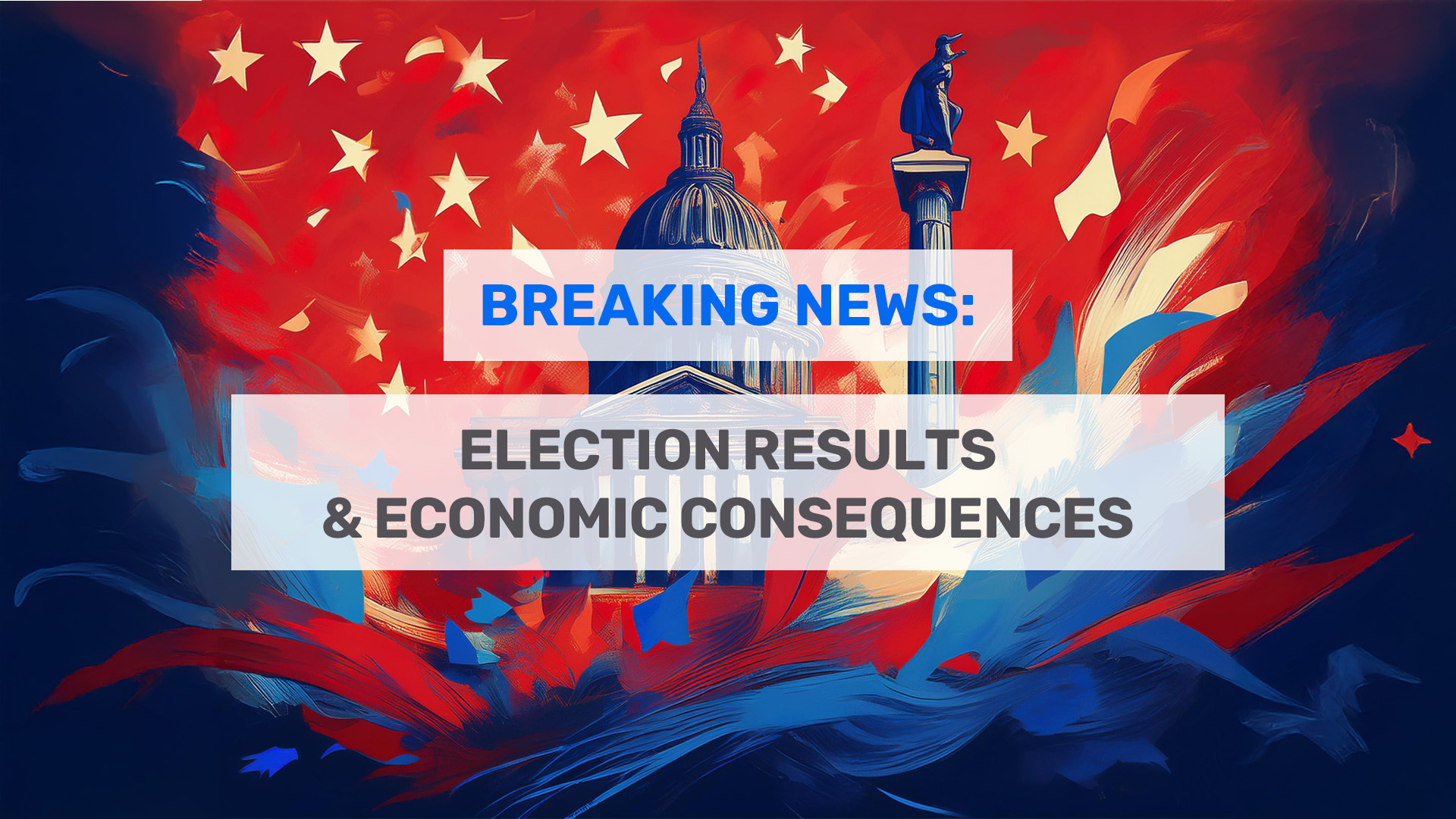Trump Wins – What That Means for the Economy and Your Business
In today’s newsletter:
- Trump Wins – What That Means for the Economy and Your Business
- Tech Rallies, Market Watch, and Church Planting
- The Watch-Men: Wasson Watch Co. Is Unashamed of the Christian Faith
This morning, in the dark and early hours, the decision desk called Wisconsin and Pennsylvania, two of the so-called “Blue Wall” states for Trump, giving him the final electoral votes he needed to become the 47th president of the United States.
“This is incredible,” said Daily Wire host Ben Shapiro. “Truly the greatest political comeback of our lifetimes.”
The other hosts quickly agreed with him. It would be hard not to agree. In the entire history of the United States, only one other president (Grover Cleveland) had non-consecutive terms in the white house. It’s an incredible reversal of fortunes for the once-and-future president.
Some states still need to certify their results, but what now seems plain is that this country is getting Trump and a Republican Senate majority – so let’s break down what that means for the economy:
Trump Tax Cuts Will Be Extended
Regular readers of this publication may recall that there has been much discussion over the looming expiration date on the 2017 Trump Tax Cuts, which would have greatly increased the average American’s personal tax burden as well as the tax burden of small businesses. So, many Americans are breathing a sigh of relief that the cuts will very likely be extended, now that Trump is heading into office. This also, more than likely, means that the “Pass-Through Deduction” for small businesses, which allows business owners to exclude up to 20% of their pass-through income from federal income tax, will also continue.
But Trump has other tax initiatives as well.
Additional Exemptions and New Cuts
Donald Trump’s proposed tax policy would eliminate taxes on tips, on overtime, and on Social Security income. He intends to repeal his own cap on SALT deductions, which seems like a somewhat strange choice for a Republican president, as this would essentially benefit blue states to the disadvantage of red states and lower federal tax revenue from the nation’s wealthiest individuals.
Trump has also stated that he intends to lower the corporate tax rate from 21% to a mere 15% for companies that exclusively produce within the United States. This stands in stark comparison to Kamala Harris’ proposal, which would have seen corporate taxes increase to 28% across the board, and an attempt to tax unrealized gains for the wealthy in society.
Forbes says that a Trump victory means a 12% swing in terms of corporate profits – Harris’ plan would have decreased S&P earnings by 8%; Trump’s plan will increase them by 4%.
Trade and Tariffs
Trump has proposed a universal 10% tax on all imports coming into the United States, with several other tariffs on top of that for particular countries and goods, including an additional 60% levy on Chinese goods, and possibly a 25% rate for Mexican goods. These uncommonly severe tariffs could be coming from a desire to increase U.S. federal revenue, a desire to box out economic rivals globally and to foster domestic production and commerce. Additionally, he could be taking an overly harsh stance for negotiation reasons, so that he can work out more favorable trade deals for the U.S. in the future.
Trump’s tariff plans have some experts worrying, but the Wall Street Journal says that in reality, Trump’s proposed numbers are, in fact, likely higher than what he will ultimately implement and that we could see unexpectedly good results as in the early days of his first term.
The Strategy
This year’s election did not have a fiscal conservative on the ballot. Harris’ proposals would have modestly increased 10-year federal revenue, but they also would have increased the national debt by trillions and severely damaged long-run GDP, wages, and jobs.
To be fair, Trump’s proposals are projected to cost even more than Harris’, to the tune of a $3 trillion blow to U.S. federal revenue over the next ten years (and nearly $6 trillion added to the deficit), although some analysis also states that the plan will create additional long-term GDP growth of nearly 1%, as well as a nearly 1% additional increase in long-term wage growth. It may also produce up to half a million jobs. Essentially, since neither candidate intended to touch the historic levels of debt the U.S. government has accumulated, nor address the unsustainable expenditures of Social Security and other entitlements, we had two different visions for going forward: increase revenue by implementing much heavier taxes, or increase revenue by growing the economy.
Trump has decided he can outpace the debt by rapid economic growth. It’s a bold and risky move that has many economists worried, but if successful, it would be much better both in the long run and for the daily life of the average American.
“We’re all about growth,” Trump said. “We’re going to bring companies back to our country.” He even goes so far as to say that his plan will not raise the federal debt – a statement seemingly contradicted by every major economic pundit in the country.
But even if successful, his current plan would have other costs. Universal tariffs would certainly raise the prices of nearly every retail good in the country – a difficult reality to face given the already-elevated prices that have resulted from years of inflation.
Deregulation
Perhaps the greatest opportunity for the American economy under Trump, and a reason to hope for the success of his growth strategy, is Trump’s great preference for deregulation. And this time around, he has some powerful allies to help him in that fight, including Elon Musk, whom Trump has said he would put in charge of a federal anti-wasteful-spending task force. Hopefully, Trump can trim some expenses around the edges of the federal budget this way, but the increased efficiency created by a deregulatory environment could be good for GDP, the stock market, and for attracting international resources into this country – tariffs or no.
TL;DR
The United States economy is a historically powerful force, but it still has some great challenges to address over the next few years. Trump hopes to outgrow the pedal-to-the-metal spending of the federal government. We’ll see if he can pull it off. Hopefully, for the sake of our businesses and bank accounts, he can.
Fun Fact
(In Partnership with Fidelitas)
Did you know the brains behind Sent To Win run a full-service marketing and PR agency? If you need help scaling your business profitably, you need to connect with Fidelitas.
Fidelitas has been helping small businesses, churches, non-profits, publicly traded companies, and even professional sports teams win for over 16 years. Fidelitas leads by serving as a Strategic Partner and prides itself on producing measurable results for its clients.
Check them out here or email Tyler@Fidelitas.co to connect directly with the CEO.
INDUSTRY INSIGHTS
Tech Rallies, Market Watch, and Church Planting
Tech Rallies
The last few years have been, in many ways, rough for the tech industry. Major layoffs, austerity, and uncertain future ROI on billions of dollars of investments into innovation. Recently, however, there is reason for optimism for some of the main players who are giving investors signals that it’s all going to be all right. Meta, for instance, often chided for its jaw-dropping expenditures into VR, AR, and AI, has just posted healthy, double-digit growth in both revenue and profit in Q3. Paypal, whose fortunes were in question not long ago, seems to be turning the ship around. Though they narrowly missed revenue expectations in the latest quarter, analysts have praised new CEO Alex Chriss (sic) for his work the past year, increasing revenue and strengthening the fundamentals. Venmo and PayPal have laid the groundwork for expanding monetization channels, giving good reason for stockholders to be optimistic in the future. Certainly, as quarterly earnings reports continue to trickle out, it won’t all be good news (Dropbox is firing 20% of its staff, and Super Micro has imploded, for example), but the current stock market rally is going to rely on tech in the coming weeks – and there’s a good chance it will keep the wave going for now.
Market Watch
The US GDP grew at a much lower rate than predicted in Q3, coming in at 2.8%. Meanwhile, bond markets show suspicions of an inflationary environment in the near future, even as the stock market rose on the eve of the election. Gold continues to rise, as it would in an inflationary environment, yet oil is holding steady and the last available CPI report shows reduced inflation. Market uncertainty has been on the rise, recently, as even mortgage rates have been affected in the run-up to the U.S. Presidential election. Trends will likely become more clear as the market begins reacting to the results of the race over the next week or two, but for the moment, the morning after President Trump’s victory, the Dow has surged, jumping over 1,300 points in pre-market trading.
Church Planting
In a powerful, short piece by Cary Niewhof, the longtime pastor describes the brave new world of church planting that exists today, and how it is quite different than what was being done even just fifteen or twenty years ago. For one thing, a LOT of churches are closing in the United States. More churches seem to be closing than opening, in fact. This would fit in with the rising apathy towards organized religion among the younger generations, and it gives pause to church planters. Niewhof argues that there is a great need for new churches to replace these old ones, but not to do so hastily. The old tactics of ‘put on a rock band and a cool, big show’ are actually turn-offs to the younger crowd. People are tired of the show, so new church plants should keep in mind less presentation and more substance. He recommends a strong support network, adequate funding, an approach that values real community and substantive practice, and, above all, moving slowly and deliberately instead of launching headfirst and fast into a church plant that may be rashly thrown together.
Sunday School
Q. In this Jewish tradition, centuries of explanation and rabbinical commentary on the Torah are compiled into a single, large, written work. What is it called?
A. The Talmud, made up of two main sections: The Mishnah, which is an in-depth expansion and explanation of the practical use of the laws in the Torah, and the Gemara, which is broader in its content and includes material beyond commentary on the Torah and Mishnah.

“Replacing the “normal” hands of the clock with a cross had seemed like such a good idea for the Christian market, but in practice, well…”
TIPS & TRICKS
The Watch-Men: Wasson Watch Co. Is Unashamed of the Christian Faith
Field watches (minimalistic, military style, precise timekeepers) are a difficult product category to compete in. These kinds of watches are favored by collectors, the space is crowded, and there are many demands on them: They have to be lightweight yet durable; they have to be very accurate; they can’t be too expensive; they have to be simple yet fresh.
You get the idea.
But a new, young company called Wasson Watch Co. is making waves in the space, partly because of their product quality, and partly for a completely different reason.
“If you’re new here,” the company recently posted on X, “the most important thing to know about us is this: Jesus Christ is King of kings and Lord of lords. We worship and follow Him.”
Their pinned tweet is, “The Christian, conservative company that shares your values,” and their company motto seems to be, “The watch company that knows what time it is.”
Basically, they aren’t hiding the ball on what they’re up to or why. On their website, Wasson Watch Co. founders Paul Brown and Travis Rudolph explain what they mean by calling their venture a Christian company:
“You can expect us to be clear and honest. Expect us to treat you the way we would want to be treated. Expect us to talk about God and [to] be open about our faith, even when it seems ‘out of place.’ …Expect us to be fierce advocates for the weak… Expect us to stand against injustice.”
Wasson Watch Co. and Paul Brown regularly speak out against abortion, specifically, and encourage people to turn to God in their daily lives. In a recent interview with anti-abortion activist Ben Zeisloft, Brown said that all of the recent attention they’ve gotten online has been only to their benefit.
“When the X account started to blow up, our sales increased too,” Brown reported. He went on to say that Wasson Watch Co. sold more watches in three days than they typically do in a month.
Some consumers have been alienated by their messaging and tactics, but among others, it has produced an enthusiastic response. As we keep an eye on the continued growth, mission, and direction of Wasson Watch Co., a few questions linger:
Is this another sign of a divided economy? Is it important to most consumers to buy products from people who share their faith, political views, and values? How vocal should a company be about its founders’ beliefs?
Wherever you land on these questions, Wasson Watch Co. has made its opinion plain. Recent viral tweets have rocketed them to a sudden 20k X following so far, and the product seems to be able to back up all of the publicity by being actually good.
Quick Hits
- Starbucks has lost the magic and sales are down. Can new CEO Brian Niccol turn it around?
- One of the filmmakers behind the upcoming documentary series “The Religion Business” was arrested outside of mega-pastor Ed Young’s Fellowship Church, after simply showing up with a sign asking for financial transparency.
- Comcast signals a possible seismic shift in business model.
- Crypto exchange platform Coinbase spent $75 million supporting candidates in this election – will that spell regulatory ease for crypto in the future?
- Boeing workers vote to end their strike.
- According to Barna, reducing inflation was the top concern of Christians going into the Presidential election.Our “Breaking News: Trump Wins” graphic was generated using AI prompts. Guess the prompt for your chance to win Sent To Win gear. Just reply to this email with your best guess.
For Kingdom Leaders, By Kingdom Leaders
Bringing Kingdom-minded leaders like you fresh perspectives and insights on business, finance, and leadership trends.









